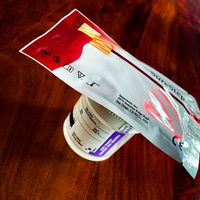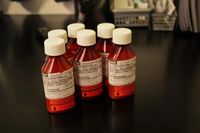For people on opioid agonist therapy (OAT), like methadone, urinary drug screens (UDS) are a staple of visits to the doctor. Sometimes patients are asked to travel all the way to a clinic solely for a random UDS. What’s the point of this screening anyway?
Urine drug testing kicked off in the 1980’s during the “war on drugs” when random drug testing entered workplaces and prisons. Today, a point-of-care (done right then and there) version of these urine tests are used to detect or validate self-reported drug use when monitoring folks on OAT.
As part of a research project, I asked 13 people on OAT and 6 healthcare providers including addiction medicine doctors, pharmacists, and other workers in the field about their thoughts on UDS. Speaking with patients, opinions ranged from “what a punitive, dehumanizing clinical tool” to “it doesn’t bother me at all”. Both patient and prescriber views on UDS weren’t necessarily polarized, but were certainly varied. To me, the undertone of UDS sort of screamed: “I don’t trust what you’re telling me”.
“To me, the undertone of UDS sort of screamed: “I don’t trust what you’re telling me”
Speaking with prescribers, I gathered that UDS are first and foremost meant to be used from a safety standpoint, not a punitive one. UDS help prescribers decide when to limit access to take home doses for patients who are actively using other drugs. I learned that UDS help many patients stay accountable to their treatment plans, and for others, provide concrete documentation of their substance use histories. One physician said that knowing which drugs people are using brings things undisclosed into an open and honest conversation. Fair, but doesn’t this presuppose that patients aren’t telling the truth in the first place? Is this test just a lie detector in disguise?
I have to stress the somewhat obvious: prescribed narcotics like methadone can cause serious harm, not only to the patient directly, but if for whatever reason they got into the hands of someone who is opioid naïve. UDS help prescribers say “okay, I can see from your urine that you are in fact taking this medication and not giving it to someone else”, because sometimes people will sell or share their OAT medication to others (called diversion). Selling or sharing methadone is often done as a practice of care in communities, called “Street Medicine”, which involves supporting a sick person that cannot access an OAT doctor or clinic.
Okay, so there are some clear safety reasons why UDS are performed. Less clear, however, is the frequency with which prescribers should be requesting UDS across provinces. There are no clear-cut Canadian guidelines. Is this because evidence is lacking for their continued, routine use?
Regardless of how often screening is done, sample quality can be an issue. Patients mentioned buying “clean” urine, tampering with their own urine samples, or downright refusing to pee. It also seems that samples can be collected supervised or unsupervised, depending on prescriber preference. Once a sample is obtained, adulterated or not, how sensitive are these screening tests? Meaning, how likely is it that they will pick up the right molecules from a patient’s urine sample. And how specific are they? Meaning, if the patient isn’t using other drugs, will the test rightly say so? Well, as it turns out these screening tests come with a lot of ambiguity.
One patient, Evelyne* told me she had her take-home doses taken away after testing positive for cocaine on a UDS. “Cocaine doesn’t magically appear in your system” the doctor said, despite the patient pleading “innocence”. Sometime later, after Evelyne’s take-homes were suspended and her urine was sent to more accurate laboratory testing, the doctor realized the initial result was wrong, known as a false positive.
Evelyne is advocating that UDS be sent to proper laboratories for testing, especially when patients say the result is a false positive. “The stakes are too high”, Evelyne says. It can mean the difference of being able to go to work every morning, or instead having to go to your pharmacy to receive your witnessed dose. From what I understand, screening tests are done in clinics via immunoassays which are cheaper, quicker, and easier than sending a sample off to the laboratory. Ideally, if one of these screens comes back positive the rest of the urine sample should be sent to a laboratory for more accurate testing. Yet, in Evelyne’s case, the course of her clinical care changed before this confirmatory test.
Here’s what I think. These tests certainly have a purpose, and an important one at that. But the accuracy of the testing is questionable and the clinical guidelines confusing, and many patients report feeling stigmatized and undermined by the person requesting this test.
I wonder how this testing could be done in a way that prioritizes safety and compassion?
During the COVID-19 pandemic UDS frequency plummeted while take-homes were prescribed at –cue the word you’re starting to hate– “unprecedented” rates. Given the scarcity of research in this area, wouldn’t it be interesting to see a study reporting the incidence of adverse effects during this timeframe of decreased UDS and increased take-homes? At the very least, we need to see quality research supporting the usefulness of UDS for patients on OAT.
I’m being taught to consider the pros and cons ordering clinical tests –will this test or the repercussions of its results cause undue harm to this patient? Will the test results persuade me to take away someone’s life-saving medication? Or, will ordering this test even change my course of action, and if not, waste precious health care resources?
“Will ordering this test even change my course of action, and if not, waste precious health care resources?”
In an already fragile relationship between someone in a position of power and a person who uses drugs, is asking for a UDS, even with the best of intentions, always worth potentially challenging a positive therapeutic relationship? Where is the scientific peer-reviewed evidence behind this practice?
For now, if tasked to ask someone to pee in a cup, I’ll try to ask in a compassionate way that affirms “I believe you, regardless of the test result”.
*Evelyne is a fake name used to protect a persons identity.




